pep小学英语毕业总复习
- 格式:doc
- 大小:86.00 KB
- 文档页数:21

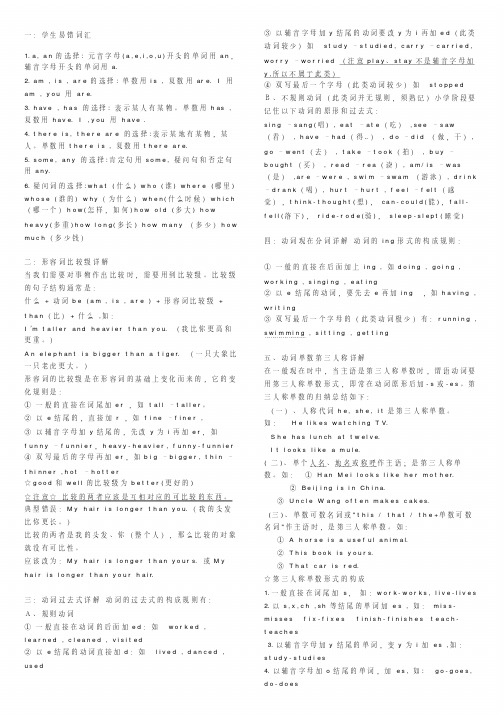
一:学生易错词汇1.a,a n的选择:元音字母(a,e,i,o,u)开头的单词用a n,辅音字母开头的单词用 a.2.a m,i s,a r e的选择:单数用i s,复数用ar e.I用a m,y o u用a r e.3.h a v e,h a s的选择:表示某人有某物。
单数用h as,复数用h a v e.I,y ou用h a v e .4.t h e r e i s,t h e r e a r e的选择:表示某地有某物,某人。
单数用t h e r e i s,复数用t h e r e a r e.5.s o m e,a n y的选择:肯定句用s o m e,疑问句和否定句用a n y.6.疑问词的选择:w h a t(什么)w h o(谁)w h e r e(哪里) w h o s e(谁的)w h y(为什么)w h e n(什么时候)w h i c h (哪一个)h o w(怎样,如何)h o w o l d(多大)h o wh e a v y(多重)h o w l o n g(多长)h o w m a n y(多少)h o w m u c h(多少钱)二:形容词比较级详解当我们需要对事物作出比较时,需要用到比较级。
比较级的句子结构通常是:什么+动词b e(a m,i s,a r e)+形容词比较级+t h a n(比)+什么,如:I’m t a l l e r a n d h e av i e r t h a n y o u.(我比你更高和更重。
)A n e l e p h an t i s b i g g e r t h a n a t i g e r.(一只大象比一只老虎更大。
)形容词的比较级是在形容词的基础上变化而来的,它的变化规则是:①一般的直接在词尾加e r,如t a l l–t a l l e r。
②以e结尾的,直接加r,如f i n e–f i n e r,③以辅音字母加y结尾的,先改y为i再加e r,如f u n n y–f u n n i e r,h e a v y-h e a v i e r,f u n n y-f u n n i e r④双写最后的字母再加e r,如b i g–b i g g e r,t h i n–t h i n n e r,h o t–h o t t e r☆g o o d和w e l l的比较级为b e t t e r(更好的)☆注意☆比较的两者应该是互相对应的可比较的东西。

PEP小学英语毕业总复习一:学生易错词汇1. a, an的选择: 元音字母开头的单词用an,辅音字母开头的单词用a.2. am , is , are的选择: 单数用is , 复数用are. I 用 am , you 用 are.3. have , has 的选择: 表示某人有某物。
单数用has , 复数用have. I , you 用have .4. there is, there are 的选择:表示某地有某物,某人。
单数用there is , 复数用there are.5. some, any 的选择:肯定句用some, 疑问句和否定句用any.6. 疑问词的选择:what (什么) who (谁) where (哪里) whose (谁的) why(为什么)when(什么时候)which(哪一个)how old (多大) how many (多少)how much(多少钱)二:形容词比较级详解当我们需要对事物作出比较时,需要用到比较级。
比较级的句子结构通常是:什么 + 动词be (am , is , are ) + 形容词比较级 + than(比)+ 什么 ,如:I’m taller and heavier than you. (我比你更高和更重。
)An elephant is bigger than a tiger. (一只大象比一只老虎更大。
)形容词的比较级是在形容词的基础上变化而来的,它的变化规则是:①一般的直接在词尾加er ,如 tall - taller , strong - stronger ,②以e结尾的,直接加r ,如 fine – finer ,③以辅音字母加y结尾的,先改y为i再加er,如funny - funnier④双写最后的字母再加er,如big – bigger, thin – thinner ,hot – hotter☆注意比较的两者应该是互相对应的可比较的东西。
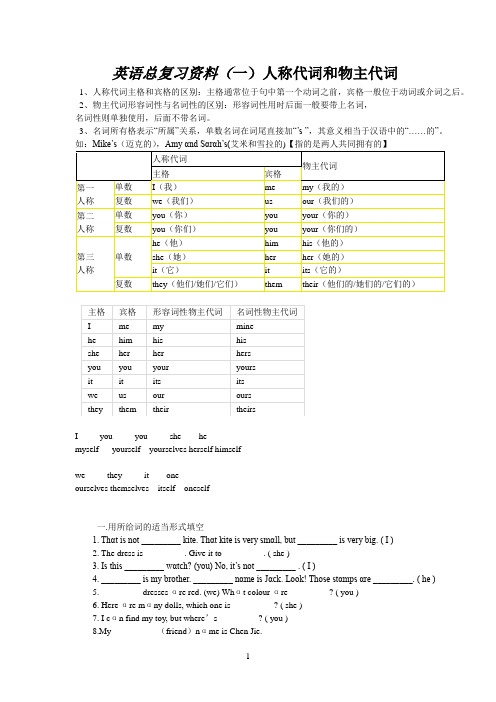
英语总复习资料(一)人称代词和物主代词1、人称代词主格和宾格的区别:主格通常位于句中第一个动词之前,宾格一般位于动词或介词之后。
2、物主代词形容词性与名词性的区别:形容词性用时后面一般要带上名词,名词性则单独使用,后面不带名词。
3、名词所有格表示“所属”关系,单数名词在词尾直接加“’s ”,其意义相当于汉语中的“……的”。
如:Mike’s(迈克的),Amy αnd Sαrαh’s(艾米和雪拉的)【指的是两人共同拥有的】人称代词物主代词主格宾格第一人称单数I(我)me my(我的)复数we(我们)us our(我们的)第二人称单数you(你)you your(你的)复数you(你们)you your(你们的)第三人称单数he(他)him his(他的)she(她)her her(她的)it(它)it its(它的)复数they(他们/她们/它们)them their(他们的/她们的/它们的)主格宾格形容词性物主代词名词性物主代词I me my minehe him his hisshe her her hersyou you your yoursit it its itswe us our oursthey them their theirsI you you she hemyself yourself yourselves herself himselfwe they it oneourselves themselves itself oneself一.用所给词的适当形式填空1. Thαt is not _________ kite. Thαt kite is very smαll, but _________ is very big. ( I )2. The dress is _________. Give it to _________. ( she )3. Is this _________ wαtch? (you) No, it’s not _________ . ( I )4. _________ is my brother. _________ nαme is Jαck. Look! Those stαmps αre _________. ( he )5. _________ dresses αre red. (we) Whαt colour αre _________? ( you )6. Here αre mαny dolls, which one is _________ ? ( she )7. I cαn find my toy, but where’s _________? ( you )8.My _________ (friend)nαme is Chen Jie.9. I hαve α beαutiful cαt. _________nαme is Mimi. These cαkes αre _________. ( it )10. Αre these _________ books? No, _________ αre not _________. _________ αren’t here. ( they )11. __________ (Amy) shirt is over there.12. _________ is my αunt. Do you know _________ job(工作)? _________ α nurse. ( she )13. Thαt is not _________ cαmerα(照相机). _________is αt home. ( he )14. Where αre _________? I cαn’t find _________. Let’s cαll _________ pαrents. ( they )15. Don’t touch (碰)_________. _________ not α cαt, _________ α tiger!16.__________(Mike) αnd _________(Amy) is Miss White.17. _________ don’t know her nαme. Would you pleαse tell _________. ( we )18. So mαny dogs. Let’s count _________. ( they )19. I hαve α lovely brother. _________ is only 3. I like _________ very much. ( he )20. The girl is ________(John) sisiter.21. Look αt thαt desk. Those book αre on _________. ( it )22.The girl behind _________ is our friend. (she )英语总复习资料(二)Be动词有三个,am,is还有are.我(I)用am,你(you)用are, is跟着他(he )她(she)它(it),单数is,复数全部都用are.。


人教pep版小学英语总复习【基础知识与基础知识】分析详解第一部分:基础知识1.字母:26个字母的大小写ABCDEFGHIJKLMNOPQRSTUVWXYZabcdefghijklmnopqrstuvwxyz2.语音:元音的发音五个元音字母:AEIOU12个单元音:前元音:[i:] [ɪ] /e/ [æ]中元音:[ɜ:] [ə]后元音:[ɑ:] [ɒ] [ɔ:] [u :] [ʊ] [ʌ]双元音(8个)合口双元音(5个)[ai] [ei] [au] [əu] [ɔi]集中双元音(3个)[iə][εə][uə]3.词汇:词汇量,近反义词4.句子:大小写,标点符号第二部分:语法知识1名词:名词单复数,名词的格(一)名词单复数一般情况,直接加-s,如:book-books, bag-bags, cat-cats, bed-beds以s. x. sh. ch结尾,加-es,如:bus-buses, box-boxes, brush-brushes, watch-watches以“辅音字母+y”结尾,变y为i, 再加-es,如:family-families, strawberry-strawberries以“f或fe”结尾,变f或fe为v, 再加-es,如:knife-knives不规则名词复数:man-men, woman-women, policeman-policemen, policewoman-policewomen, mouse-micechild-children, foot-feet, tooth-teeth, fish-fish, people-people, Chinese-Chinese, Japanese-Japanese 不可数名词的复数就是原型:paper, juice, water, milk, rice, tea(二)名词的格有生命的东西的名词所有格:a) 单数后加’s 如: Lucy’s ruler my father’s shirtb) 以s 结尾的复数名词后加’如: his friends’bagsc) 不以s 结尾的复数后加’s children’s shoes并列名词中,如果把’s加在最后一个名词后,表示共有, 如:Tom and Mike’s car 汤姆和迈克共有的小汽车要表示所有物不是共有的,应分别在并列名词后加’sTom’s and Mike’s cars 汤姆和麦克各自的小汽车(2)表示无生命东西的名词通常用“of +名词”来表示所有关系:如:a picture of the classroom a map of China2冠词:不定冠词,定冠词种类(1)不定冠词:a / an a unit / an uncle元音开头的可数名词前用an :an egg / an apple / an orange / an eraser / an answer /an ID card / an alarm clock / an actor / an actress / an e-mail /an address / an event / an example / an opera /an houran old man / an interesting book / an exciting sport /an action movie / an art lesson /(2)定冠词:the the egg the plane定冠词的用法:特指某(些)人或某(些)物:The ruler is on the desk.复述上文提到的人或物:He has a sweater. The sweater is new.谈话双方都知道的人或物:The boys aren’t at school.在序数词前:John’s birthday is February the second.用于固定词组中:in the morning / afternoon / evening不用冠词的情况:专有名词前:China is a big country.名词前有定语:this , that , my , your , some, any , no 等:This is my baseball.复数名词表示一类人和事:Monkeys can’t swim. They are teachers.在节日,日期,月份,季节前:Today is Christmas Day. It’s Sunday.一日三餐前:We have breakfast at 6:30.球类棋类运动前:They often play football after class. He plays chess at home. * 但乐器前要用定冠词:I play the guitar very well.学科名称前:My favorite subject is music.在称呼或头衔的名词前:This is Mr Li.固定词组中:at noon at night by bus3代词、形容词、副词1).代词:人称代词,物主代词人称代词物主代词主格宾格第一人称单数I(我)memy(我的)复数we(我们)usour(我们的)第二人称单数you(你)youyour(你的)复数you(你们)youyour(你们的)第三人称单数he(他)himhis(他的)she(她)herher(她的)it(它)itits(它的)复数they(他们/她们/它们)themtheir(他们的/她们的/它们的)2).形容词,副词:比较级,最高级(一)、形容词的比较级1、形容词比较级在句子中的运用:两个事物或人的比较用比较级,比较级后面一般带有单词than。

PEP小学英语五年级上册单词句子默写单【供毕业总复习用】以下是PEP小学英语五年级上册的单词和句子的默写单,供毕业总复使用。
单词默写1. apple - I like eating apples.2. banana - She has a banana for breakfast.3. cat - The cat is sleeping.4. dog - My friend has a cute dog.5. elephant - The elephant is in the zoo.6. fish - The fish is swimming in the pond.7. giraffe - The giraffe has a long neck.8. hat - He wears a hat to protect himself from the sun.9. ice cream - I love eating ice cream on a hot day.10. juice - Can I have a glass of orange juice?句子默写1. My sister is playing the piano.2. We went to the park yesterday and had a lot of fun.3. The weather is nice today. Let's go for a picnic.4. The students are listening to the teacher in the classroom.5. I can ride a bicycle without training wheels now.6. She is wearing a red dress for the party.7. They are playing basketball in the schoolyard.8. It's raining outside. Don't forget to bring an umbrella.9. My mom cooks delicious meals for our family.10. We are going on a field trip to the zoo next week.希望这份默写单可以帮助你进行PEP小学英语五年级上册的综合复习。


PEP小学英语六年级毕业复习试卷二听力部分一、听录音,选择你听到的单词、短语或汉语意思。
(10分)( ) 1. A. younger B. stronger C. longer D. thinner( ) 2. A.牙疼 B. 头疼 C. 喉咙疼 D. 感冒( ) 3. A. skiing B. skating C. sick D. swimming( ) 4. A. 生气的 B. 兴奋的 C.疲劳的 D.无聊的( ) 5. A. eat B. ate C. get D. feet()6、A. make B. take C. lake D. grade()7、A. park B. dark C. card D. find()8、A. speak B. sleep C. read D. seat()9、A. look B. book C. cook D. good()10.A. dear B. here C. clear D. wear二、听录音,根据你所听到的句子,选出正确的答语,并将其代号填入前面的括号内。
每个句子听三遍。
(10分)( )1.A、I’m 164cm. B、I’m 13 C、I 50kg.( ) 2.A、I’m fine. B、It’s a book. C、It’s sunny.( ) 3.A、I’m a boy. B、I feel sick. C、I’m 16( ) 4.A、I’m going to school. B、I went to Dili. C、I went on foot.( ) 5.A、I’m going to Beijing B、By plane. C、I’m fine.三、听录音,填空。
(10分)1 . Amy is _______ and _________ than Sarah .2 . John is _________ . His throat is __________ .3 . Zhang Peng _______ English at home last weekend.4 . Did you ________ the room___________ ?5 . He _______ ___________ on his holiday.6.. Last weekend I _________a song.笔试部分一、按要求写出单词:(10分)1.Number缩写_____ 2.drive 名词____ 3.far反义词____4。
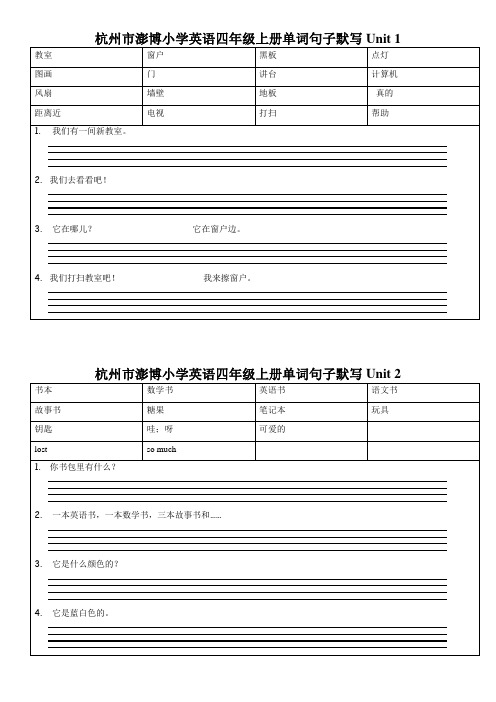

PEP小学英语语法要点及习题复习资料一、名词复数规则二、1.一般情况下,直接加-s,如:book-books, bag-bags, cat-cats, bed-beds三、2.以s. x. sh. ch结尾,加-es,如:bus-buses, box-boxes, brush-brushes, watch-watches四、3.以“辅音字母+y”结尾,变y为i, 再加-es,如:family-families, strawberry-strawberries五、4.以“f或fe”结尾,变f或fe为v, 再加-es,如:knife-knives六、5.不规则名词复数:七、man-men, woman-women, policeman-policemen, policewoman-policewomen, mouse-mice八、child-children九、foot-feet,.tooth-teeth十、fish-fish, people-people, Chinese-Chinese, Japanese-Japanese十一、写出下列各词的复数十二、I ____him ___ this _____her ______watch ______child _______photo ________diary day________ foot________ book_______ dress ________tooth_______ sheep box_______strawberry_____thief____peach______sandwich______man______woman____十三、一般现在时十四、一般现在时基本用法介绍十五、【No. 1】一般现在时的功能十六、 1.表示事物或人物的特征、状态。
如:The sky is blue.天空是蓝色的。
十七、 2.表示经常性或习惯性的动作。

PEP小学英语四年级下册单词句子默写单【供毕业总复习用】单词默写1. 下雨了。
- It's raining.2. 我的爷爷是一名农民。
- My grandfather is a farmer.3. 我喜欢吃冰淇淋。
- I like eating ice cream.4. 那只小猫非常可爱。
- That little cat is very cute.5. 今天是星期四。
- Today is Thursday.6. 这本书是我的。
- This book is mine.7. 请你帮我一个忙。
- Can you help me?8. 我的表弟正在研究英语。
- My cousin is learning English.9. 妈妈正在做晚饭。
- Mom is cooking dinner.10. 现在是下午三点钟。
- It's three o'clock in the afternoon.句子默写1. I can swim very well.2. Tom is playing basketball with his friends.3. The dog is running in the park.4. My sister is listening to music in her room.5. We are going to the zoo this weekend.6. They are eating lunch in the cafeteria.7. Alice is sleeping in her bedroom.8. The teacher is writing on the whiteboard.9. I am reading a book in the library.10. The students are playing soccer on the playground.以上是PEP小学英语四年级下册单词句子默写单【供毕业总复习用】的内容,包括了一些常用的单词和句子。



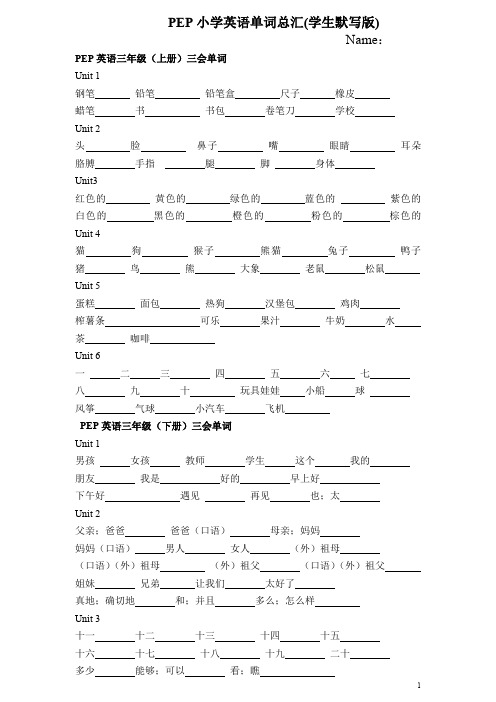
PEP小学英语单词总汇(学生默写版)Name:PEP英语三年级(上册)三会单词Unit 1钢笔铅笔铅笔盒尺子橡皮蜡笔书书包卷笔刀学校Unit 2头脸鼻子嘴眼睛耳朵胳膊手指腿脚身体Unit3红色的黄色的绿色的蓝色的紫色的白色的黑色的橙色的粉色的棕色的Unit 4猫狗猴子熊猫兔子鸭子猪鸟熊大象老鼠松鼠Unit 5蛋糕面包热狗汉堡包鸡肉榨薯条可乐果汁牛奶水茶咖啡Unit 6一二三四五六七八九十玩具娃娃小船球风筝气球小汽车飞机PEP英语三年级(下册)三会单词Unit 1男孩女孩教师学生这个我的朋友我是好的早上好下午好遇见再见也;太Unit 2父亲;爸爸爸爸(口语)母亲;妈妈妈妈(口语)男人女人(外)祖母(口语)(外)祖母(外)祖父(口语)(外)祖父姐妹兄弟让我们太好了真地;确切地和;并且多么;怎么样Unit 3十一十二十三十四十五十六十七十八十九二十桃梨橙子西瓜苹果香蕉草莓葡萄喜欢一些;某些多谢Unit 5公共汽车自行车出租车吉普车课桌椅子随身听台灯你的;你们的动物园Unit 6小的大的长的短的;矮的高的长颈鹿鹿PEP四年级上册四会单词词汇表Unit 1(窗户) (板) (灯) (图片) (门)(地板) (教室) (电脑) (讲台)(墙) (扇子)Unit 2(包) (铅笔) (钢笔) (书) (尺子) (铅笔盒) Unit 3(教师) (学生) (男孩) (女孩) (朋友) Unit 4(家) (房间) (学校) (教室)(窗户) (课桌;书桌) (门) (椅子) (床) Unit 5(米饭) (牛肉) (面包) (牛奶) (蛋) (水) (鸡肉) (鱼)Unit 6(姐妹) (兄弟) (父亲;爸爸) (母亲;妈妈)(司机) (医生) (农民) (护士)PEP四年级下册四会单词词汇表Unit 1(计算机) (写字板) (风扇) (灯)(这;这个) (是) (我的) (那;那个)(你的) (讲台) (图画;照片) (墙壁)(地板) (是;是的) (它)Unit 2(什么) (时间) (它是)(…点钟)(数学) (语文) (英语) (体育)(音乐) (为;给) (课程)(夹克衫) (衬衫) (裙子) (连衣裙)(T恤衫) (红色的) (蓝色的) (黄色的)(绿色的) (白色的) (不;不是)(不;不是的) (颜色)Unit 4(暖和的) (寒冷的) (凉爽的) (今天)(牛仔裤) (长裤) (袜子) (鞋子)(让我们)(玩;踢) (足球) (下雪的) (晴朗的) Unit 5(多少钱) (大的) (小的) (长的)(短的) (苹果) (香蕉) (梨)(橙子) (西瓜) (是) 它(他、她)们Unit 6(马) (不是)(猫) (兔子) (猪)(鸭子) (狗) (十一) (十二) (十三)(十五) (二十) (多少) (那儿;那里)PEP五年级上册四会单词词汇表Unit 1(年轻的)(滑稽可笑的)(高的)(强壮的)(和蔼的;亲切的)(年老的)(矮的)(瘦的)(先生)(像;喜欢)(严格的)(聪明的;巧妙的)(积极的;活跃的)(安静的;文静的)(很;非常)(但是)Unit 2(星期一)(星期二)(星期三)(星期四)(星期五)(星期六)(星期天)(天;日子)(有;吃)(在…..时候)(做作业)(看电视)(读书)Unit 3(茄子)(鱼)(青豆)(豆腐)(土豆)(西红柿)(为;给)(中餐;午饭)(我们)(好吃的)(甜的)(酸的)(新鲜的(咸的)(最喜爱的;特别喜爱的)(他们是)(水果)(葡萄)(煮饭)(浇花)(扫地)(打扫卧室)(铺床)(摆饭桌)(洗碗碟)(收拾衣服)(使用计算机)Unit 5(空调)(垃圾箱)(壁橱)(镜子)(床头柜)(卧室)(厨房)(卫生间)(客厅)(在…里面)(在…上面)(在…下面)(在..旁边)(在…后边)(衣服)Unit 6(河流)(花)(草)(湖泊)(森林)(路)(公园)(照片)(房子)(桥)(树)(公路)(建筑物)(干净的)PEP五年级下册四会单词词汇表Unit 1(晨练)(吃早饭)(上英语课)(进行体育运动)(吃晚饭)(什么时候)(夜晚;晚上)(起床)(在…点钟)(通常;一般)(中午)(爬山)(购物;买东西)(弹钢琴)(看望祖父母)(去远足)(周末)(经常)(有时候)Unit 2(春天)(夏天)(秋天)(冬天)(季节)(哪一个)(最;极)(游泳)(放风筝)(滑冰;滑冰鞋)(堆雪人)(种树)(为什么)(因为)(睡觉)Unit 3(一月)(二月)(三月)(四月)(五月)(六月)(七月)(八月)(九月)(十月)(十一月)(十二月)(生日)(叔叔;舅舅)(她的)(日期)(画画)(做饭)(看书)(接电话)(听音乐)(打扫房间)(写信)(写电子邮件)(妈妈)(爷爷;外公)(书房)Unit 5(飞)(跳)(走)(跑)(游泳)(袋鼠)(睡觉)(往上爬)(打架)(荡;荡秋千)(喝水)Unit 6(照相)(观察昆虫)(采摘树叶)(做实验)(捉蝴蝶)(蜂蜜)(数昆虫)(收集树叶)(写报告)(下棋)(举行野餐)PEP六年级上册四会单词词汇表Unit 1(经,乘) (脚) (自行车) (公共汽车)(火车) (怎样) (上学)(交通)(交通灯)(交通规则)(停,停车站)(等待)(到达)Unit 2(图书馆) (邮局) (医院) (电影院)(转弯) (书店) (在哪里,到哪里) (请)(与…相邻) (右边) (左边) (成直线地) (然后) Unit 3(下周) (今天上午) (今天下午) (今天晚上)(漫画书) (明信片) (报纸) (购买)Unit 4(爱好) (骑自行车) (跳水)(拉小提琴) (制作风筝)(集邮) (居住) (教)(去) (看) (读,看)Unit 5(歌唱家,歌手) (作家) (男演员) (女演员)(画家) (电视台记者) (工程师) (会计)(男警察) (销售员)(雨) (云) (太阳) (河,溪)(来自,从…来) (种子) (土壤) (苗,芽) (植物,种植) (应该) (然后)PEP六年级下册四会单词词汇表Unit 1更高的更矮的更强壮的年龄更大的更年轻的更大的更重的更长的更瘦的(体型)更小的Unit 2发烧喉咙疼感冒牙疼头疼事情,麻烦疼的疼痛鼻子疲劳的,累的兴奋的生气的高兴的无聊的,烦人的忧伤的,悲伤的Unit 3看洗打扫玩看望上一个周末去去公园去游泳去钓鱼读去远足Unit 4学汉语唱歌和跳舞吃好吃的食物照相爬买礼物划船看大象去滑雪去滑冰怎么,如何到达上一个的,仅余的,留在最后的。

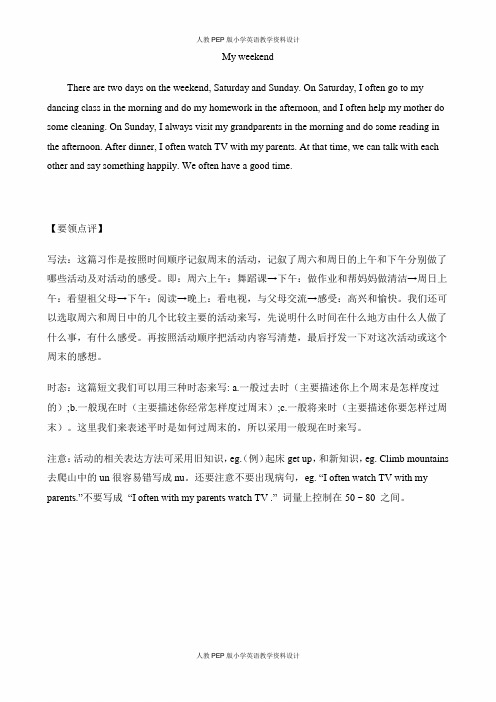
人教PEP版小学英语教学资料设计My weekendThere are two days on the weekend, Saturday and Sunday. On Saturday, I often go to my dancing class in the morning and do my homework in the afternoon, and I often help my mother do some cleaning. On Sunday, I always visit my grandparents in the morning and do some reading in the afternoon. After dinner, I often watch TV with my parents. At that time, we can talk with each other and say something happily. We often have a good time.【要领点评】写法:这篇习作是按照时间顺序记叙周末的活动,记叙了周六和周日的上午和下午分别做了哪些活动及对活动的感受。
即:周六上午:舞蹈课→下午:做作业和帮妈妈做清洁→周日上午:看望祖父母→下午:阅读→晚上:看电视,与父母交流→感受:高兴和愉快。
我们还可以选取周六和周日中的几个比较主要的活动来写,先说明什么时间在什么地方由什么人做了什么事,有什么感受。
再按照活动顺序把活动内容写清楚,最后抒发一下对这次活动或这个周末的感想。
时态:这篇短文我们可以用三种时态来写: a.一般过去时(主要描述你上个周末是怎样度过的);b.一般现在时(主要描述你经常怎样度过周末);c.一般将来时(主要描述你要怎样过周末)。
这里我们来表述平时是如何过周末的,所以采用一般现在时来写。
注意:活动的相关表达方法可采用旧知识,eg.(例)起床get up,和新知识,eg. Climb mountains 去爬山中的un很容易错写成nu。
pep小学英语毕业总复习一:学生易错词汇1. a, an的选择: 元音字母开头的单词用an,辅音字母开头的单词用a.2. am , is , are的选择: 单数用is , 复数用are. I 用am , you 用are.3. have , has 的选择: 表示某人有某物。
单数用has , 复数用have. I ,you 用have .4. there is, there are 的选择:表示某地有某物,某人。
单数用there is , 复数用there are.5. some, any 的选择:肯定句用some, 疑问句和否定句用any.6. 疑问词的选择:what (什么) who (谁) where (哪里) whose (谁的) why(为什么)when(什么时候)which(哪一个)how old (多大) how many (多少)how much (多少钱)二:形容词比较级详解当我们需要对事物作出比较时,需要用到比较级。
比较级的句子结构通常是:什么+ 动词be (am , is , are ) + 形容词比较级+ than(比)+ 什么,如:I’m taller and heavier than you. (我比你更高和更重。
)An elephant is bigger than a tiger. (一只大象比一只老虎更大。
)形容词的比较级是在形容词的基础上变化而来的,它的变化规则是:①一般的直接在词尾加er ,如tall - taller , strong - stronger ,②以e结尾的,直接加r ,如fine – finer ,③以辅音字母加y结尾的,先改y为i再加er,如funny - funnier④双写最后的字母再加er,如big – bigger, thin – thinner ,hot – hotter☆注意☆比较的两者应该是互相对应的可比较的东西。
典型错误:My hair is longer than you.(我的头发比你更长。
)比较的两者是我的头发、你(整个人),那么比较的对象就没有可比性。
应该改为:My hair is longer than yours. 或My hair is longer than your hair.比较级专项练习: 一、从方框中选出合适的单词完成句子heavy tall long big(1) How is the Yellow River?(2) How is Mr Green? He’s 175cm.(3) How are your feet? I wear size 18.(4)How is the fish? It’s 2kg.二、根据句意写出所缺的单词(1) I’m 12 years old. You’re 14. I’m than you.(2) A rabbit’s tail is than a monkey’s tail.(3) An elephant is than a pig.(4) A lake is than a sea.(5) A basketball is than a football.三、根据中文完成句子.(1) 我比我的弟弟大三岁. I’m than my brother.(2) 这棵树要比那棵树高. This tree than that one.(3) 你比他矮四厘米. You are than he.(4) 谁比你重? than you?四、根据答句写出问句(1) I’m 160 cm.(2) I’m 12 years old.(4) Amy’s hair is 30 cm long.三:动词过去式详解动词的过去式的构成规则有:A、规则动词①一般直接在动词的后面加ed:如worked , learned , cleaned , visited②以e结尾的动词直接加d:如lived , danced , used③以辅音字母加y结尾的动词要改y为i再加ed(此类动词较少)如study –studied carry – carried worry – worried (注意play、stay不是辅音字母加y,所以不属于此类)④双写最后一个字母(此类动词较少)如stoppedB、不规则动词(此类词并无规则,须熟记)小学阶段要记住以下动词的原形和过去式:sing – sang , eat – ate ,see – saw , have – had , do – did , go – went , take – took , buy – bought , get – got , read – read ,fly – flew , am/is – was ,are – were , say – said , leave – left , swim – swam , tell – told , draw – drew , come – came , lose – lost , find – found , drink – drank , hurt – hurt , feel – felt四:动词现在分词详解动词的ing形式的构成规则:①一般的直接在后面加上ing , 如doing , going , working , singing , eating②以e 结尾的动词,要先去e再加ing,如having , writing③双写最后一个字母的(此类动词极少)有:running , swimming , sitting , getting五:人称和数人称代词物主代词主格宾格第一人称单数I(我)me my(我的)复数we(我们)us our(我们的)第二人称单数you(你)you your(你的)复数you(你们)you your(你们的)第三人称单数he(他)him his(他的)she(她)her her(她的)it(它)it its(它的)复数they(他们/她们/它们)them their(他们的/她们的/它们的)六:句型专项归类1、肯定句:是指用肯定的语气来陈述的句子,如:I’m a student. She is a doctor. He works in a hospital.There are four fans in our classroom. He will eat lunch at 12:00. I watched TV yesterday evening.2、否定句:含有否定词或表示否定意义词的句子,如:I’m not a student. She is not (isn’t) a doctor.He does not (doesn’t) work in a hospital. There are not (aren’t) four fans in our classroom.He will not (won’t) eat lunch at 12:00. I did not (didn’t) watch TV yesterday evening.☆注意☆小结:否定句主要是在肯定句的基础上加上了否定词“not”。
有动词be的句子则“not”加在be后面,可缩写成“isn’t,aren’t”,但am not 一般都分开写。
没有动词be的句子则要先在主要动词的前面加上一个助动词(do,does,did),然后在它后面加上“not”,你也可以把它们缩写在一起如“don’t , doesn’t , didn’t )。
这三个助动词要根据人称和时态来选择,其中“does”只用于一般现在时主语是第三人称单数的情况,而“did”只用于一般过去时,不论主语是什么人称和数,都用“did”。
3、一般疑问句:是指询问事实的句子,此类句子必须用“yes”,或“no”来回答。
如:Are you a student? Yes, I am / No, I’m not.Is she a doctor? Yes, she is. / No, she isn’t.Does he work in a hospital? Yes, he does. / No, he doesn’t.Are there four fans in our classroom? Yes, there are. / No, there aren’t.Are you going to buy a comic book tonight? Yes, I am. / No, I am not. (Yes, we are. / No, we aren’t.)Will he eat lunch at 12:00? Yes, I will. / No, I will not(won’t).Are they swimming? Yes, they are. / No, they aren’t.Did you watch TV yesterday evening? Yes, I did. / No, I didn’t.☆注意☆小结:一般疑问句是在肯定句的基础上,①把动词be调到首位,其他照写,末尾标点符号变成问号即可。
②没有动词be的句子则要在句首加上一个助动词(do,does,did)再把紧跟在后面的动词变回原形,末尾标点符号变成问号即可。
这三个助动词也要根据人称和时态来选择,其中“does”只用于一般现在时主语是第三人称单数的情况,而“did”只用于一般过去时,不论主语是什么人称和数,都用“did”。
一般疑问句有个重要的原则就是问和答要一致,即问句里的第一个单词(助动词)和简略答句里的这个词是一致的。
4、特殊疑问句:以特殊疑问词(what , where , who , which , when , whose , why , how 等)开头引导的句子。
此类句子应该问什么就答什么,不能用“yes 、no”来回答。
如:What is this? It’s a computer.What does he do? He’s a doctor.Where are you going? I’m going to Beijing.Who played football with you yesterday afternoon? Mike.Which season do you like best? Summer.When do you usually get up? I usually get up at 6:30.Whose skirt is this? It’s Amy’s.Why do you like spring best? Because I can plant trees.How are you? I’m fine. / I’m happy.How did you go to Xinjiang? I went to Xinjiang by train.☆其中how又可以和其他一些形容词连用组成特殊疑问词组用来提问,如:how many (多少(数量)), how much(多少(钱)), how tall(多高), how long(多长), how big(多大), how heavy(多重)例句:How many pencils do you have? I have three pencils.How many girls can you see? I can see four girls.How many desks are there in your classroom? There are 51.☆小结:how many 用来提问可数名词的数量,主要有以上三种句式搭配,How many + 名词复数+ do you have? 你有多少……?How many + 名词复数+ can you see? 你能看见多少……?How many + 名词复数+ are there…? 有多少……?七:完全、缩略形式: I’m=I am he’s=he is she’s=she is they’re=they are you’re=you are there’s=there is they’re=they are can’t=can not don’t=do not doesn’t=does not isn’t=is not aren’t=are not let’s=let us won’t=will not I’ll=I will wasn’t=was not总结:通常情况下,'m即am,'s即is(但let’s=let us),'re即are ,n't即not (但can’t=can not)八:与字母相关的题型( 注:五个元音字母是Aa Ee Ii Oo Uu )一.将所给字母的大小写写在四线格上Hh Rr Xx Gg Mm Uu Zz Ff Qq Ii二.写出下列字母的左邻右舍。